Rod Miller's Blog, page 33
September 20, 2015
Goodnight Goes Riding off with an award.
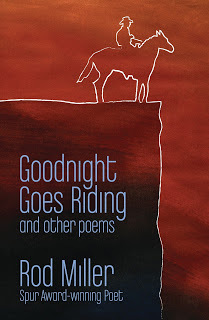
Westerners International recently announced the winners of their annual awards honoring the best writing about the West by the nearly 5,000 members of the organization, from some 64 groups in the USA and 16 or so in other countries. My collection of poetry from Pen-L Publishing, Goodnight Goes Riding and Other Poems, won the Fred Olds Western Poetry Award. I am, as you might imagine, thrilled with the recognition and look forward to hanging the handsome plaque, featuring the Westerners’ “Old Joe” buffalo skull, on the wall. You can own your very own copy of this award-winning book (one of its poems was also a Finalist for a Western Writers of America Spur Award for Best Western Poem) by visiting www.pen-l.com, the usual online booksellers, or you can order it through your local bookstore.The holiday gift-giving season is rapidly approaching (Christmas stuff is already showing up in stores!) so you might want to keep that in mind. Someone you love would love this book.
Published on September 20, 2015 05:34
September 12, 2015
Singing songs and slapping leather.
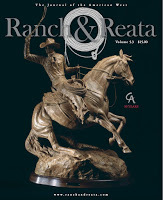
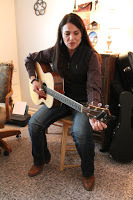
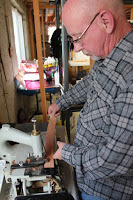
The new issue of Ranch & Reata magazine is out, and in its pages are two stories I had the pleasure to write about two remarkable Westerners.Mary Kaye is a much-honored singer and songwriter living in Utah’s Sanpete Valley with her guitars and husband and 10 children. (Well, not really—some of the 10 are grown and have moved on, but there’s still a houseful.) Mary has integrated two, and sometimes four, of her daughters into the act and “The Kaye Sisters” as they are known are making a name for themselves. If you’re a fan of Old West action shooting, you’ve probably seen Tim Start’s handiwork. He designs and builds holsters and accessories for cowboy shooters, and his leather adorns some of the best. Tim’s high-performance pistol holsters, with his High Desert Leather maker’s mark, range from the unadorned to works of art with inlays and tooling and silver other embellishments. Read about these remarkable people in the new issue of Ranch & Reata. If you don’t receive this classy magazine, subscribe here: www.ranchandreata.com.
Published on September 12, 2015 06:32
September 3, 2015
Mary-made music.
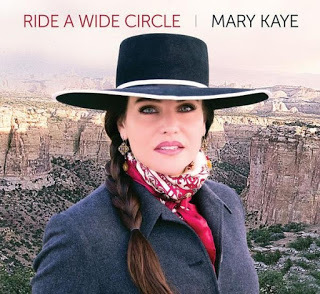
Soon, you’ll be hearing about a Ranch & Reataarticle I wrote about Mary Kaye. She’s a singer and songwriter of epic proportions. In my pantheon of contemporary Western songwriters, she’s right up there with Brenn Hill and Dave Stamey and a few others whose worthy words do the West justice. And the truth is, she’s a lot better looking than those guys.Beyond her ability to weave words into music, Mary Kaye has a voice that can rattle the rafters and caress the soul with equal facility. Now, you’re probably thinking I am overstating the situation. If anything, I am unable to find the words that do Mary Kaye’s music justice. I have enjoyed all her albums. But the brand-newest one is the bestest. It’s a master work. Mary Kaye wrote most of the songs on Ride a Wide Circle. She co-wrote some and lights up a few old cowboy tunes. Her husband, who co-produced the album, said their goal was to put together a collection that made the “skip” button on players obsolete. They did it.Ride a Wide Circle by Mary Kaye. Damn, that’s good.
Published on September 03, 2015 08:58
August 27, 2015
Lies They Tell Writers, Part 18—Get an Agent.

The writing world has changed. And I am of the opinion that most of those changes have diminished the importance of the literary agent. Not so many years ago, a writer had to be represented by a literary agent to have any chance of getting published by a reputable firm. To some extent, that’s still the case—certain imprints of the international publishing conglomerates turn their noses up at direct submissions. Queries from authors are lucky to earn a rejection. Most often, they are simply ignored. But there are many, many small, medium-sized, and even large publishing houses more than happy to deal directly with writers. And, of course, there are innovations like digital publishing and e-books that essentially bypass the traditional publishing process—including agents. So, does an aspiring author need an agent? I would never say it’s a bad idea, assuming you can hook up with one who’s reputable and recognized. On the other hand, I don’t think it’s necessary. I have managed to publish books with ten or so publishers, from fairly large ones to teeny-tiny ones, all with nary an agent in sight. And at least a few of those publishers had stated policies of not accepting un-agented submissions.Of course my ability to evaluate contracts is lacking compared to the expertise of an agent. And, if I were overwhelmed with keeping track of royalties and subsidiary rights and such, I’m sure an agent would come in handy. So far, however, my misdirected, misguided, and mismanaged literary career doesn’t require a whole lot of the skill or savvy an agent might provide. Come to think of it, that might be the problem….
Published on August 27, 2015 17:14
August 13, 2015
Writing about Phil and Bill.
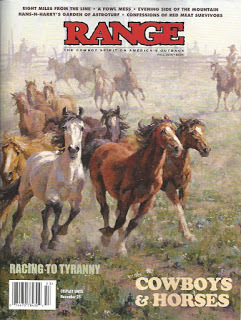
The summer 2015 issue of range magazine has arrived in mailboxes and on newsstands around the West. Inside its pages are two articles I wrote about interesting Westerners. Phil Kennington is a well-known cowboy poet who has entertained readers and audiences alike for decades. But Phil’s life is much bigger than poetry. He was raised on a ranch where he learned early on to handle livestock—an education that served him well later in life. He spent decades lifting horses’ legs and tacking on shoes. You can read about Phil in the “Red Meat Survivors” section in the magazine. Also featured is a ranch that lies between Utah’s Wasatch Plateau and San Rafael Swell. The Quitchumpah Ranch is owned and operated by Bill Stansfield, who runs cattle on Fish Lake National Forest permits, a BLM lease on the San Rafael Desert, and his own pastures. Stansfield—with help from family and friends—was branding calves the day I visited. Some photos from that day were posted here earlier; others accompany the article. Read these stories and more in range. If you don’t subscribe, you can remedy that here: www.rangemagazine.com.
Published on August 13, 2015 06:09
August 3, 2015
Can you judge a book by its cover?
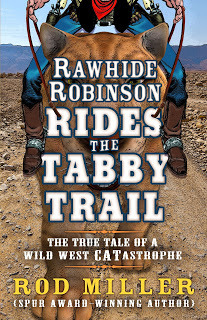
The old saying says no—you can’t judge a book by its cover. Book publishers say yes—readers ought to be able to glean a good deal about what’s inside a book by the nature of its cover. And, for the most part, they live by that belief. The covers of romance novels share a certain similarity. As do mysteries. And science fiction. And thrillers. And fantasy. And other categories of books. Including, of course, Westerns. Which brings up the subject of my forthcoming Western novel (look for it in December), Rawhide Robinson Rides the Tabby Trail. While it is certainly a Western novel, you’d have to cast a pretty wide loop to catch it with the usual herd. For one thing, it’s humorous—something I think is sadly lacking in Westerns. And most other fiction, for that matter. For another thing, while there are a few confrontations where people get shot at, but I don’t think anybody gets shot. And again, like its Spur Award-winning predecessor, Rawhide Robinson Rides the Range, it’s filled with lies—or, to use more polite language, tall tales. Or, as Rawhide Robinson would have you believe, the absolute truth. Those differences are probably why the cover doesn’t look much like a typical Western novel. Still, the cover does tell you something about what’s inside—a book that’s not much like a typical Western novel.Finally, if the quality of the artwork on the cover is any indication, what’s inside is likely to be pretty darn good.If I do say so myself.
Published on August 03, 2015 05:00
July 25, 2015
Lies They Tell Writers, Part 17: Follow the Formula

“Genre” publishing is what they often call it. The business side of the business has created all these boxes to fit books into, whether responding to reader expectations or creating them. There’s my favorite box—Westerns. And there are mysteries, science fiction, fantasies, romances, thrillers, “chick lit,” and on and on. And each classification often includes sub-genres, such as Action Westerns, Historical Westerns, Western Romances, Western Mysteries, and Adult Westerns, for instance.All this categorization is fine. Many readers want to know what they’re in for. The problem is, giving readers what they expect often gets carried to extremes, resulting in formulaic sameness and stagnation. Sometimes it gets downright mechanical and methodical—someone has to get kissed by page such and such, there must be a gunfight every thus-and-so many pages, there must be at least two-point-five incidents of some-such every so often, and that sort of thing. I have even heard of authors and editors creating graphs to chart expected events and adjusting the story to fit. All well and good. Except one would be hard pressed to find a widely recognized and highly acclaimed novel that adheres to any formula. Lonesome Dove doesn’t conform to anyone’s expectations. Blood Meridian breaks all the rules when it comes to Western novels. Elmer Kelton traveled his own trail more often than not. I once heard him say that rather than being “six-foot-two and bullet proof” as expected in a heroic Western character, his were more likely to be “five-foot-seven and nervous.” There are, of course, many other examples of successful novels in every genre that do not follow the formula.So, when you have a story to tell, don’t turn it into ingredients for someone else’s recipe—tell it the way it wants to be told.
Published on July 25, 2015 10:47
July 17, 2015
Back in the Saddle.
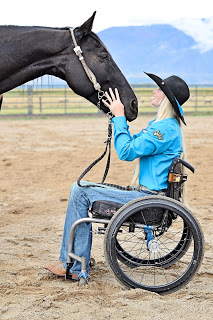
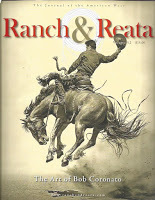
In the June-July issue of Ranch & Reata magazine ( www.RanchandReata.com ), you’ll find a feature article I wrote about Amberley Snyder. But all my words on all those pages do not capture her spirit and attitude, I think, as well as the closing lines of Charles Badger Clark’s poem “The Westerner”:
For the sun wheels swift from morn to mornAnd the world began when I was born And the world is mine to win.
Amberley has been horseback from an early age, and winning buckles and saddles and trophies in the rodeo arena for nearly as long. A truck wreck—and the resulting paralysis—that would have sidelined most of us barely slowed Amberley down. She, and her horses, learned to ride again and she is back to her winning ways. There’s just no holding this young woman back, and her enthusiasm for making the most of every new day is an inspiration.
( The photo of Amberley and her barrel horse Power is by Lauren Anderson: www.facebook.com/Landersonphoto )
Published on July 17, 2015 06:45
July 10, 2015
Me and my big mouth.
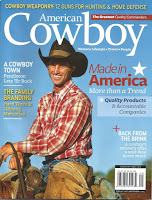
There’s no mistaking the fact that the American West faces a conundrum of quandaries, complications, obstacles, problems, predicaments, pickles, trials, troubles, hurdles, hitches, challenges, difficulties, and other such stuff. Times might be tougher than ever before in history. On the other hand, it could be that we hear more bad news more often because of the omnipresent communications technology we’re saddled with these days. Whatever the case, the West—and the world—would be a better place if we would stop shouting at one another and sit down and simply talk. That, more or less, is the premise of an opinion piece I wrote for the current issue of American Cowboy magazine. Lines from the poem “The Second Coming” by William Butler Yeats inspired the essay. “The centre cannot hold,” he wrote. And I argue it is because of these later lines from the poem: “The best lack all conviction, while the worst are full of passionate intensity.” The August-September American Cowboy is on newsstands now and, of course, available by subscription. ( www.americancowboy.com ) If my opinion doesn’t suit you, you’ll likely find plenty else in the magazine’s pages that will.
Published on July 10, 2015 16:23
July 4, 2015
Lies They Tell Writers, Part 16: Just Say It.
 Some time ago, I said in one of these screeds that in good writing “what” you say is important, but “how” you say it is every bit as—if not more—important. That prompted a comment from a friend, fellow writer, and former teacher that, to his way of thinking, the two are inseparable. I guess we are of different minds. Here’s an explanation. In some of the workshops I teach I use this example to demonstrate:
Some time ago, I said in one of these screeds that in good writing “what” you say is important, but “how” you say it is every bit as—if not more—important. That prompted a comment from a friend, fellow writer, and former teacher that, to his way of thinking, the two are inseparable. I guess we are of different minds. Here’s an explanation. In some of the workshops I teach I use this example to demonstrate:“In 1776, our founding fathers, desiring freedom and equality for all, created the American nation.”
That sentence is a fairly good, if simplistic, explanation of the birth of our country. It says what it needs to say and does so in a straightforward manner without a lot of foofaraw. But, the same thought, the same idea, the same “what,” in the hands of a better writer comes out this way:
“Four score and seven years ago our fathers brought forth on this continent, a new nation, conceived in Liberty, and dedicated to the proposition that all men are created equal.”
That writer was, of course, Abraham Lincoln, opening the lid on his immortal Gettysburg Address. And while my line captured the “what” of it equally well, it will never be immortal. All because Mr. Lincoln didn’t just say it—he paid more attention to the “how” of saying it. (If you look hard enough, you’ll see Honest Abe circled in the 1863 photo, below, from the Gettysburg dedication ceremony.)
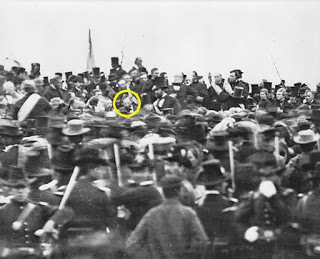
Published on July 04, 2015 06:02



